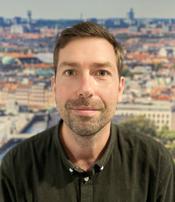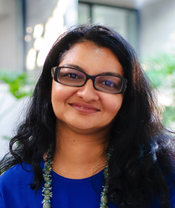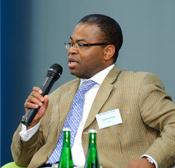Virtual Summit speakers
Emil Birk (CSR Consultant, City of Copenhagen, Denmark)
Since 2022 Emil has worked as a CSR Consultant in the City of Copenhagen, establishing the City Council's decision to promote the City's suppliers' compliance with human rights and fundamental rights at work in the global value chain. Before joining the City of Copenhagen, Emil worked as an international program consultant in the Danish Trade Union Development Agency, where he managed the organization's support to local trade unions in Latin America and Asia. In this capacity he developed and supervised capacity building projects and strategies to strengthen local unions, enhance social dialogue and expand their membership base. He holds a master's degree in development studies and international politics.
Björn Claeson (Executive Director, Electronics Watch)
Based in Sweden, Björn has more than 15 years experience addressing public procurement and labour rights in global supply chains. He cofounded the US national advocacy network SweatFree Communities, which has been instrumental in dozens of state and local campaign successes aimed at using taxpayer money to protect workers' rights in global supply chains. He helped set up a US national network of public sector buyers, the Sweatfree Purchasing Consortium, to encourage public sector buyers to address labour rights in global supply chains collaboratively. Björn also served as Senior Policy Analyst with the Washington DC based International Labor Rights Forum, authoring several reports on labour rights and safety in Bangladeshi apparel factories. He is trained in cultural anthropology with a Ph. D. from the Johns Hopkins University.
Dr James Cockayne (New South Wales Anti-Slavery Commissioner, Australia)
Dr James Cockayne is NSW's inaugural independent Anti-slavery Commissioner. Prior to his appointment Dr Cockayne was an international lawyer, professor of global politics and anti-slavery leader. James' career has involved work in the Australian and international public service, legal practice, and with the private sector. He has helped develop ethical and responsible business frameworks for the private security industry, financial sector and global technology companies. A former member of the World Economic Forum Global Futures Council for Equity and Social Justice, Dr Cockayne was a founder of Code 8.7, Finance Against Slavery and Trafficking (FAST) and the UN anti-slavery knowledge platform, Delta 8.7. Dr Cockayne has previously led the UN University Centre for Policy Research, the US Council on Foreign Relations Study Group on Human Trafficking, the Center for Global Counterterrorism Cooperation, and the Transnational Crime Unit of the Commonwealth Attorney-General's Department.
Lisa Dipnarine (Senior Bus Business Development Manager, TfL, UK)
Lisa Dipnarine is the Senior Bus Business Development Manager, in Bus Operators at Transport for London and has worked in the organisation for over 15 years in various roles. Lisa is responsible for developing and delivering TfL's air quality strategy for London's Bus fleet.
Previously, Lisa successfully supported the upgrade of the entire bus fleet to meet Euro VI compliance, and is now developing the strategy to deliver an entirely zero-emission bus fleet no later than 2034.
Annelie Evermann (Procurement Sustainability Manager, ITDZ Berlin, Germany)
A lawyer in the field of business and human rights and socially responsible public procurement (SRPP), Annelie Evermann has worked with organisations including Amnesty International and WEED - World Economy, Ecology and Development, where she was one of the founders of Electronics Watch. She has accompanied legislative proposals at federal and state levels, addressed procurement events nationwide on the topic of sustainable public procurement, and conducted training and consultations on SRPP for contracting authorities. She is currently sustainability manager for the Central Procurement Department at ITDZ Berlin, the central IT service provider for the federal state of Berlin.
Omana George (Monitoring and Civil Society Engagement Manager, Electronics Watch)
Omana has been an organizer and promoter of occupational health and safety in Asia with 17 years of regional experience in the area of labour rights. She played an essential role in building and supporting the Asian Network for the Rights of Occupational and Environmental Victims (ANROEV), a network of grassroots organizations in more than 20 countries and territories in Asia. She has carried out trainings and other OSH initiatives in Indonesia, Malaysia, Vietnam, Philippines, India, Mexico and Nepal with trade unions and worker organizations in the electronics industry and in other sectors like garments and construction. Omana was recently awarded the Rachel Lee Jung-Lim Award in memory of the life of this campaigner for a global asbestos ban. She holds a Master's degree from the University of Madras.
Yap Hwa (Communication officer, IndustriALL, Malaysia)
Yap Hwa is communications, research and campaigns officer at IndustriALL South East Asia Office, based in Kuala Lumpur, Malysia.
Jonathan Janssens (Coordinator of Gent Fair Trade, Belgium)
Jonathan Janssens is coordinator of Gent Fair Trade, a collaboration between the City of Ghent and Oxfam Gent. With a team of local youngsters, Gent Fair Trade is setting up local campaigns and activities on social justice and sustainable trade. Within the city's administration, Jonathan is advising the buying team on sustainable procurement practices, focused on social justice. Prior to working for Gent Fair Trade, he was chairman of the NGO CATAPA, a Gent based activist organisation fighting the social and ecological injustice linked to big scale mining. He is trained as an Environmental Scientist at the University of Antwerp.
Claude Kabemba (Executive Director, Southern Africa Research Watch (SARW), South Africa)
Claude Kabemba is a political economy expert with 25 years direct experience working in research and policy on democratic governance and development fields in Africa. His areas of expertise include democratization, natural resource governance, African state, civil society engagement and conflict resolution, election politics with field experience in Southern and Central Africa. He is currently the Executive Director of the Southern Africa Resource Watch. Their work focuses on the promotion of a transparent, accountable and equitable management of natural resources in Africa. He holds a PhD in International Relations from the University of the Witwatersrand.
Kjersti Koffeld, Sustainability Advisor, City of Oslo, Norway
Kjersti Koffeld works in the City of Oslo's Agency for Improvement and Development as a sustainability advisor.
She is responsible for following up on human rights due diligence requirements in the citywide framework agreements. Kjersti has more than 19 years of experience of working with international development in various sectors and countries, and has previously worked both in civil society organizations, international NGOs and the Norwegian Agency for Development Cooperation. She has a strong background in human rights, with a particular focus on children's rights.
Esty Marcu (Director, Modern Slavery Unit, University of Sydney, Australia)
Esty Marcu is the Director of the Modern Slavery Unit at the University of Sydney, Australia, where she is leading the University's strategic response to the Modern Slavery Act and enabling academic excellence on business and human rights. She currently lectures at the University of Sydney Business School on creating shared value, business and human rights, and improving ESG performance. Prior to her role in the higher education sector, Esty spent over 10 years working with both federal and state government departments in Australia on complex public policy issues such as migration policy, refugee settlement, international development, health policy and strategic governance. Esty is also the Co-founder and Director of the anti-slavery non-profit Project Girl Code, a tech-based organisation providing digital literacy and coding skills to survivors of trafficking and slavery in Cambodia
Cristian Martin (Head of Procurement, LSE, UK)
Cristian has over 20 years' experience in public procurement. His career has included various roles for the NHS, Commonwealth Secretariat, a public procurement consortium and a number of senior procurement roles in the UK higher education sector. He is currently Director of Procurement for the London School of Economics and Political Science. Cristian is passionate about responsible procurement and the role of public procurement for the betterment of society. He holds an MSc in strategic procurement management and is MCIPS chartered.
Olga Martin-Ortega (Senior Advisor for Remediation in Global Supply Chains, Electronics Watch, UK)
Olga is Professor of International Law at the School of Law, University of Greenwich, where she leads the Business, Human Rights and the Environment Research Group (BHRE). She has been researching business and human rights for over ten years and is an expert on public procurement and human rights, human rights in global supply chains and due diligence. She has also undertaken extensive research in the areas of post-conflict reconstruction, transitional justice and international criminal law. She has advised the EU Parliament on mandatory human rights due diligence regulation and worked with the ILO on Fair Labour Recruitment and Human Rights, as well as collaborating with numerous UK public bodies.
Robert McCorquodale, UN Working Group on Business and Human Rights
Robert McCorquodale is a member of the United Nations Working Group on Business and Human Rights, a five-member group of independent experts. He is Emeritus Professor of International Law and Human Rights at the University of Nottingham, and a barrister and mediator at Brick Court Chambers in London, after having worked in Australia. With over 30 years of experience working in business and human rights, Robert has published widely in this area, including through empirical research, and has advised business of all sizes and assisted governments and civil society around the world. His work has included capacity building, legislative proposals and training, as well as interviewing and qualitative research. He has appeared as an advocate before the International Court of Justice and the United Kingdom Supreme Court, and as a legal expert before United Nations bodies.
Dhurba Mijar (Executive Director, Migration Dristi, Nepal)
Dhurba Mijar is a former migrant worker and Co-founder & Executive Director of Migration Dristi.
Migration Dristi is a migrant-led organization with a mission to integrate migrant workers from South Asia and beyond (Bangladesh, India, Indonesia, Nepal, and Myanmar) into the mainstream of ethical, legitimate, fair, and responsible recruitment processes.
Rocío Paniagua (Low Emission Vehicle Programme Manager, Electronics Watch)
Before joining Electronics Watch, Rocío headed the Business Integrity Programme at Transparency International-UK. She led the delivery of the Programme to achieve real change in the fight against corruption. Previously, Rocío worked as a Senior Legal Manager with the International Bar Association Legal Policy & Research Unit, where she led projects in the areas of corporate and judicial integrity, and business and human rights. A member of the Madrid Bar Association, she has previously worked as a Legal Officer in the International Department of the Spanish National Bar Association and in two major re-insurers in London and Dublin. Rocío has a law degree at the Autónoma University of Madrid and undertook additional law studies at the Roma Tre University in Italy and the Complutense University of Madrid, where she earned a Masters in International Cooperation for Development.
Peter Pawlicki (Director of Outreach and Education, Electronics Watch)
Based in Germany, Peter has more 10 years of experience researching the globalisation of the electronics industry and its effects on working conditions and labour rights. He has been part of several international research projects on contract manufacturing and has co-authored, "From Silicon Valley to Shenzhen: Global Production and Work in the IT Industry." Before coming to Electronics Watch he coordinated European Social Fund-financed projects at IG Metall, focusing on works council trainings. Peter has an MA in Political Science and PhD in Sociology from Johann-Wolfgang-Goethe University, having focused his doctorate on "Engineers and Work in Global Design Networks of the Semiconductor Industry."
Deepika Rao (Executive Director, Cividep, India)
Deepika Rao is Executive Director at Cividep India. Cividep is a Bangalore based organisation which works for workers' rights and corporate accountability. It attempts to empower workers and communities and to ensure that businesses comply with human and labour rights and environmental standards. With this objective, it educates workers, studies effects of corporate conduct, initiates dialogue with various stakeholders and advocates for policy change. Deepika has been working with Cividep for the past 8 years, and has held various positions supporting projects and organisational development. She holds a Bachelor's degree in Marine engineering and a Masters in Social Entrepreneurship. Her previous work experience has been that of working on merchant oil tankers as a maintenance engineer.
André Siedenberg (attorney-at-law and consultant, Germany)
André Siedenberg has been working as a lawyer and consultant in the public procurement sector for more than ten years.
His work mainly focusses on social and ecological aspects in tender processes for IT-Hardware, textiles and food. Among his clients are NGOs, municipalities and bidders.
Linda Szabó (founding member, Periféria Policy and Research Center, Hungary)
Linda Szabó is a founding member of the Periféria Policy and Research Center, a non-partisan, independent think tank, based in Budapest; which provides knowledge and policy tools for public, private, and civil society actors, related to labor and housing issues as well as urban and regional development. Szabó graduated from the Sociology and Social Anthropology Department of the Central European University; previously, from the Public Service Department of the Corvinus University of Budapest. She has been participating in several international researches concerning migration, labor, urban regeneration, and inequality policies.
Kristel Tonstad (Policy Director, Norwegian National Contact Point for Responsible Business Conduct, Norway)
Kristel Tonstad is Policy Director at the Norwegian National Contact Point for Responsible Business Conduct. Prior to this, she served as Head of Secretariat of the Ethics Information Committee, which presented the draft Transparency Act to the Norwegian Government in 2019. She is co-author of legal commentaries to the Transparency Act. In the Ministry of Foreign Affairs, Tonstad has worked with government policies on human rights and responsible business conduct. She has previously served as a Norwegian diplomat in Egypt and has worked as legal advocacy and policy adviser in the Norwegian Refugee Council and with UNICEF in Haiti and in the Republic of Georgia. She has also worked as an independent advisor focusing on business and human rights. Tonstad has a law degree from the University of Oslo and a Master's in Public Policy from Harvard University.
Daria Toschi (Anti-Slavery Lead at Griffith University, Australia)
Daria Toschi is a highly experienced Business and Human Rights Professional with over 15 years of experience across Europe, Asia, Latin America, and Australasia in the private and non-profit sectors.
Throughout her career, she has worked with companies such as The Walt Disney Company, Unilever, and KPMG-Banarra, as well as international organizations like the International Training Centre of the ILO and the Royal Tropical Institute. Her work has focused on advancing the respect for workers' rights, mitigating the risk of human exploitation in global supply chains, while creating brand value. Daria is also an SA8000 auditor, having participated in numerous on-site social audits in Europe, Latin America, China, Central and Southeast Asia.
Jo Versteven (Federal Institute for Sustainable Development, Belgium)
Jo Versteven is a sustainable development expert at the Belgian Federal Institute for Sustainable Development. For more than 15 years, he has worked on the development of sustainable procurement policy at the Belgian federal level. He achieves this through international consultation, helping in drafting regulations and providing tools, training and awareness-raising. In recent years, he has been actively working on defining priority product groups for environmentally friendly, social and circular procurement. He is also actively involved in the work on transparency and due diligence of the Circular and Fair ICT Pact and the Low Emissions Vehicle Program of Electronics Watch
Fabrice Warneck, Director of Monitoring, Electronics Watch
Based in Brussels, Fabrice has worked for French, European and global unions in several sectors for 15 years. Fabrice was involved in promoting best value in public procurements via European social dialogue achievements between employers and trade unions. He has supported trade union capacity building campaigns and participated in negotiations for global framework agreements. Over the last nine years, Fabrice led the Europe and International affairs consulting activities of Syndex, a cooperative that provides support to worker representatives and trade unionists. He is specialised in industrial relations, comparative labour law and international project management.

























